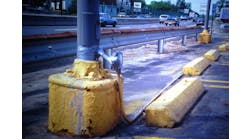Bus bar connections are critical in electrical installations. I want to clarify some items in the May “Back to Basics” article.
Most bus bars are silver or tin-plated—not copper plated. The purpose of plating is to reduce oxidation, thus improving the connections. This thin plating can scrape off easily. Abrasive cleaning will likely remove the plating, leading to hot joints and potential failure. A solvent cleaning process is the preferred method.
The method suggested for maintaining joint tightness may be confusing. The article said, “Manufacturers have determined...you get the most reliable connection by using steel bolts and steel flat washers.” Many UL standards require using spring washers (Belleville) or lockwashers and a flat washer. Our tests show the coolest, most reliable joint is with a Belleville washer. A properly torqued Belleville washer compensates for the different thermal expansion rates of the steel bolt and bus bars.
You shouldn’t flatten the Belleville. You should compress it to 80% of its free height to give you room for expansion and contraction. Based on our experience, properly designed and torqued Belleville washer joints will not work loose in the field.
Finally, the article states: “don't reuse any locking devices, especially Belleville washers.” This probably applies to split ring lockwashers. These lockwashers lose their “bite” after reuse. Yet, you can reuse properly designed and torqued Belleville washers.
Frederick A. Reker, P.E.
Square D Co.
Nashville, TENN.
Author's Reply
Every point Mr. Reker makes is correct. I did not suggest you must file a bus bar before assembling. Usually, solvent is all you need. However, many people do use abrasive methods. Sometimes, these are necessary, sometimes not. The article points out proper abrasive cleaning techniques, in either case.
It’s true Belleville washers normally do not work loose in the field. However, anything can work loose under vibration, heat, corrosion, or other factors—causing catastrophic results. Thus, an annual visual inspection is good preventive maintenance. I must reinforce Reker’s point that while other washers usually lose their “bite,” the Belleville washer is like a pit bull when it comes to clamping.
The mention of steel bolts and flat washers was not to the exclusion of Belleville washers or other locking devices. A flat washer is not a locking device—you must use it with a locking device.
Reker also addresses locking device reuse. I contacted two manufacturers, and they said reuse is application- specific. The differentiating factor is whether your Belleville has sharp edges or not (most Bellevilles do not). Belleville washers do not lose spring capacity. If a manufacturer says to reuse a Belleville, then doing so should result in no performance loss whatsoever. The article’s statement about not reusing a Belleville is incorrect in most circumstances, but correct in some. The statement would have been better had it read: “If you are unsure about your particular style of Belleville washer, then it is better to replace it than to reuse it where you shouldn't.” —M.L.L.


